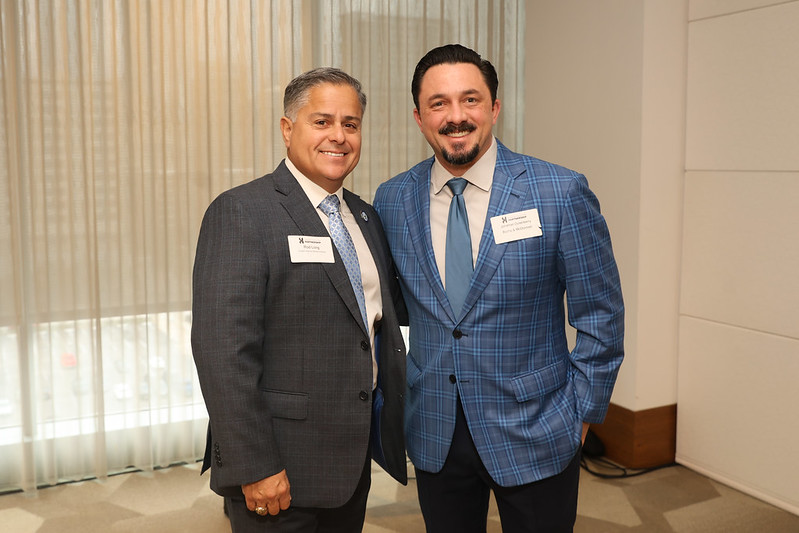Houston Economy to Face Major Job Losses, Recession from Coronavirus and Oil Plunge
Published Apr 01, 2020 by Kelsey Seeker
Houston is likely to see significant job losses and a prolonged drain on its economy from the COVID-19 coronavirus.
That was one of the major takeaways from a virtual presentation by Patrick Jankowski, Partnership Senior Vice President of Research, on March 31. Jankowski discussed his latest analysis of COVID-19, collapsing oil prices, the imminent U.S. recession, and their impact on Houston’s economy.
Jankowski stressed that because of the unprecedented and ongoing nature of the situation, predicting the economic impact is difficult at this time. “With the situation changing daily, we can’t really get a good read on what’s actually going on yet,” he said.
Jankowski referenced the next Bureau of Labor Statistics’ jobs report, which will be based on the number of employees on payroll during the second week of March and won’t include the waves of layoffs that happened during the third and fourth weeks of March. It won’t be until the April report is released in early May when we will see the real impact on the job market.
Pandemic will determine recession’s length and severity
“We are coming off a period of 113 consecutive months of job growth, the longest expansion in US history and a phenomenal jobs report,” Jankowski said. “Last week we saw 3.3 million claims for unemployment benefits, and I believe that number will only rise as more people are laid off, the system becomes less overloaded and people figure out how to apply for benefits.”
Given the single week of job losses based on the initial claims for unemployment insurance in Texas and Houston’s share of Texas’ jobs, Jankowski estimates mid-March losses in the region will be around 37,945 jobs.
Jankowski noted that measures to combat the coronavirus are also combating the economy. He referenced the U.S. GDP forecasts from major financial institutions that estimate a decline in GDP for the first quarter of the year that continues through the rest of the year.
“From my perspective - yes, we are in a recession and the situation will worsen in Q2,” Jankowski said. “We hope to have some growth in Q3, but we will end of the year worse off than at the beginning.”
Add that to the drop in oil prices and the Texas Railroad Commission being asked to regulate crude oil production for this first time since the 1970s, Jankowski believes the crude collapse will only add to Houston’s misery.
Small businesses and other industries hurt the worst
Jankowski mentioned the Partnership’s survey of its small business members and found that 29% were unable to deliver goods or services, 59% are operating below half capacity and the most concerning, that 41% can survive only 1 to 4 weeks.
He also highlighted industry sectors that are most at risk during this initial period and the 777,000 jobs tied to those sectors. The sectors include those impacted by social distancing (like retail), those whose services can’t be delivered remotely (such as plumbers and other home services), those that aren’t considered essential (such as the arts), and most small businesses (that tend to operate on thin margins).
“If this virus continues after May, every job is at risk, every sector is at risk,” Jankowski stressed. “And even if you are working from home and able to provide services to some degree, you may be affected. We will see additional layoffs to what we’ve already experienced.”
Houston predicted to lose at least 150,000 jobs
There are two ways to predict how Houston will fare – looking at models based on assumption or based on history.
The Institute for Regional Forecasting shows 18 different scenarios of how the virus and oil prices will play out, with the most likely scenario from their prediction showing Houston down by 44,000 jobs. On the other hand, The Perryman Group’s model is forecasting 256,000 jobs lost.
“These are two very different forecasts and you’re really seeing that uncertainty play out in these models,” Jankowski said.
By referencing the history of recessions Houston has experienced, Jankowski estimates Houston’s jobs loss will hover between 150,000 jobs and 350,000 jobs.
“Given how Houston fairs when oil is faring badly and then when the US economy not doing well, we are likely to look like between 2008-09 recession and oil bust we had in the 1980s,” Jankowski said.
With a job loss of 13.2% from 1982, that amounts to about 417,450 jobs today. Using the Great Recession benchmark of 4.5%, that loss is closer to 142,325 jobs.
Collapsing oil prices on par with 1982 energy bust
With the tensions between Saudi Arabia and Russia spilling onto the world stage and affecting the price of crude, Houston has already felt the effects.
On March 30 of this year, the price of oil closed at $21.07 a barrel. During that same month in 1982, the price was $10.25 but adjusted for inflation, it closed at $24.37 a barrel.
“We can expect crude to slowly climb back into the low $30s by mid-summer without a Russia-Saudi deal,” Jankowski said. “We’ll see any jobs we regained from the 2014 fracking bust disappear and a leaner, smaller industry in the next two years with more consolidations and bankruptcies taking place.”
Houston in one word – resilient
One of the biggest determining factors in an economic rebound will be the level of fear people still have around the virus, Jankowski said. Even on the downward slope people will practice at least a degree of social distancing. He reiterated the damaging shock to consumer confidence the virus has caused.
“The economy really won’t be able to recover until people feel comfortable spending again. However, if there’s one word I would use to describe Houston, it would be resilient,” Jankowski said. “We've been through five downturns since the 1980s and yet the economy is larger now and more diverse than ever before.”
 The Houston Report
The Houston Report



















